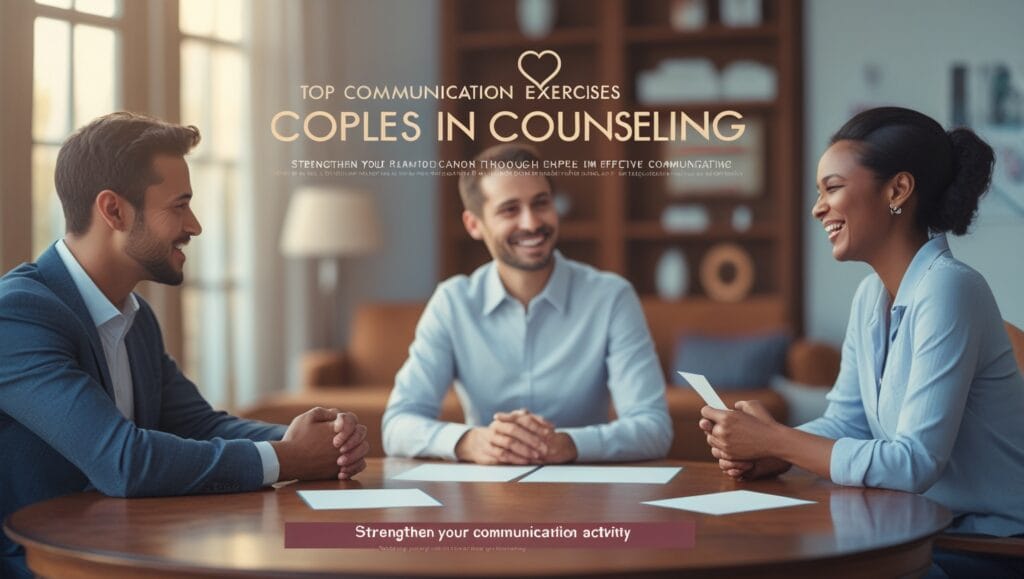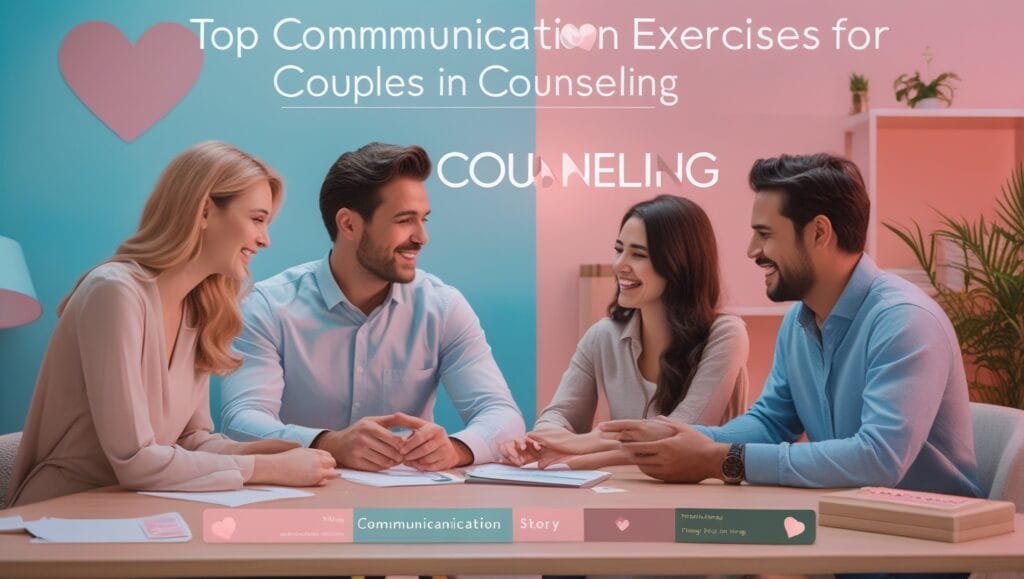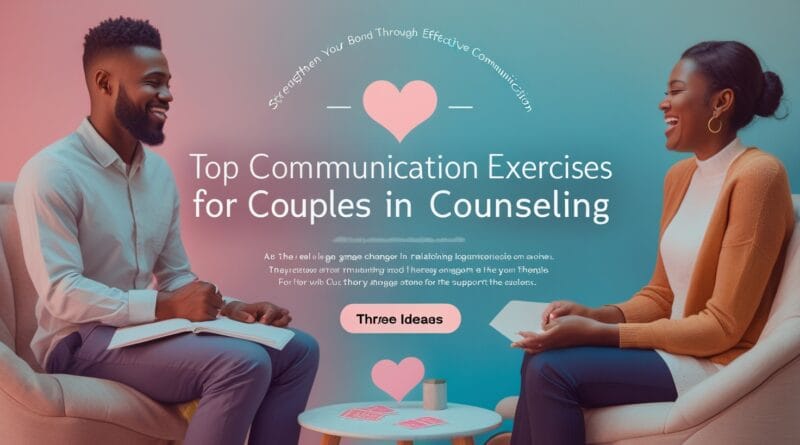Top Communication Exercises for Couples in Counseling
Communication is the backbone of any successful relationship. For many couples, busy schedules, unresolved conflicts, or different communication styles can make one minor misunderstanding develop into a lengthy disagreement. That’s where counseling comes in-and more specifically, communication exercises-that can help relationships become stronger.
In this blog, explore a step-by-step approach to some of the most viable communication exercises available for couples during counseling. Whatever your stage-either being a present therapist in sessions, a probable attendant of couple counseling, or maybe seeking ways of strengthening a bond-these suggestions below are bound to develop more strong, healthier connections.
Why Is Communication Important in Relationships?
When communication goes, misunderstandings follow. Poor communication, in due course, leads to resentment, emotional distance, and in many cases separation or divorce. On the other hand, open and honest communication allows them to develop trust and intimacy and work on challenges together.
A study published in the Journal of Marriage and Family Therapy indicates that couples possessing good communication skills show more satisfaction and resiliency in their relationships. Many sessions of therapy will have communication exercises aimed at reinforcing these skills, from active listening to conflict resolution.
If there were tension or inconsistency in the communication in your relationship-you aren’t alone-and there’s nothing wrong with seeking an overview.
The Best Exercises on Communication for Couples in Counseling
Therapists often suggest some structured exercises in which couples can engage to help them communicate more fruitfully. Following is a discussion of six highly effective exercises that are used during the counseling session.
- The Speaker-Listener Technique
The Speaker-Listener Technique: This is a basic exercise of deep listening and clarity of expression. Couples take turns playing the “speaker” and “listener” role with pre-defined rules for each.
How It Works:
- The Speaker: Without blame or judgment, shares feelings or thoughts. The sentences begin with “I feel” rather than “You always.”
- The Listener: To confirm understanding, he paraphrases what he has heard, responding with phrases like, “What I’m hearing is.” or “I understand that you feel.”
This exercise will help couples not interrupt each other and will promote empathy and active listening.
- The Thank You Ritual
Gratitude is a real game-changer in relationships, though it is often neglected. The Thank You Ritual places the main emphasis on your gratitude toward your partner for various acts, no matter how insignificant they may seem.

How It Works:
- At the end of the day, take turns sharing something specific you’re thankful for.
- For example, “Thank you for making coffee this morning” or “I really appreciate how you listened to me vent about work.”
This activity helps the couples focus on each other’s positive attributes, which breeds affection and less tension between them.
- Reflective Listening
Reflective listening works wonders in clearing up heated arguments or misunderstandings. This exercise enables couples to clarify intentions and feelings by echoing each other’s words.
How It Works:
- One partner speaks to describe a thought or feeling.
- The other partner listens without interrupting and then repeats back in his words what was said.
- The original speaker confirms if the restatement is correct or provides clarification.
This way, both partners will feel understood and less defensive.
- The Five Love Languages Quiz
Developed by Dr. Gary Chapman, the five love languages—words of affirmation, acts of service, receiving gifts, quality time, and physical touch—shed light on how people want to give and receive love.
How It Works:
- One small quiz-one that is free online-to determine what love languages both partners have.
- Discuss findings and brainstorm ways to integrate more of each other’s love languages into daily life.
Understanding and speaking your partner’s love language can greatly enhance emotional intimacy.
- Ground Rules for Conflict Resolution
No relationship can avoid disagreements, but what matters is how the couples work through that conflict. Certain ground rules-like taking turns, or no name-calling-can make discussions less inflammatory and more constructive. How It Works: Discuss and decide on the rules for respectful communication when an argument takes place. Examples include not interrupting, no personal attacks, and taking a break if too much emotion becomes overwhelming. Thus, it’s easier for them to be prepared in case disputes arise.
- Journaling Together
Journaling is not only good for the individual; it can also bring a couple closer. It entails shared prompts to which each partner expresses thoughts or feelings in writing.

How It Works:
- Devote time to write responses to particular prompts, for example, “What is something you appreciate about our relationship?” or “What’s one challenge you’d like us to work on together?”
- Later, share with each other what you’ve written.
This can also allow couples to discuss sensitive topics at a comfortable pace.
Friendly Asked Questions About Relationship Communication
- How do I know if couples counseling is right for me?
Couples counseling can benefit anyone looking to better their relationship-either you and your partner are working through recurring conflicts, a huge life transition, or you simply want to strengthen your relationship. It isn’t just for couples in crisis.
- Can communication exercises replace therapy?
While exercises in communication may help a couple through some common problems, therapy provides personalized guidance from a professional. Exercises are most effective if they are done in tandem with counseling, especially for more complex or longstanding challenges.
- What if my partner refuses to try communication exercises?
Some partners may resist doing exercises in communication, especially if they feel it is “unnecessary” or “silly.” The best way to begin is to introduce exercises in a casual and low-pressure manner. If resistance persists, a therapist can provide ways to encourage participation.
- How often should we practice these exercises?
Consistency is key. Try to practice one or two exercises a week and build from there. Sometimes, just carving out the time-for example, a “weekly communication check-in”-can make it easier to get into the groove.
- Will these exercises work for a long-distance relationship?
Absolutely, many exercises like reflective listening, journaling, or the Thank You Ritual can be adapted to work over video calls or messages.
The Next Step in Your Relationship
It takes time and effort to build better communication skills, but it is well worth the effort. With these exercises practiced regularly, a relationship can be based on trust, openness, and mutual respect.
If you’d like professional guidance, consider reaching out to a certified couples counselor. Working with a therapist experienced in relationship dynamics can help you and your partner uncover new ways to connect and thrive.
Remember, communication isn’t just about solving problems; it’s about deepening your connection and appreciating each other’s diverse perspectives.

